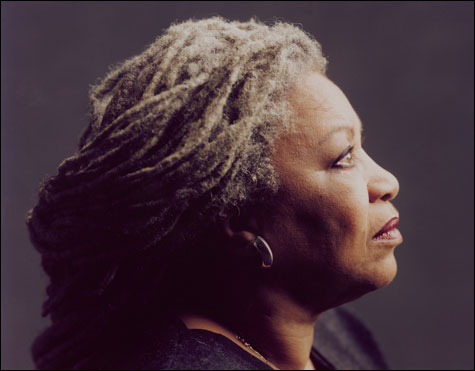
SLAVE SONG: Morrison’s characters — and history itself — sometimes disappear in the æther of her poetic prose. |
| A Mercy | By Toni Morrison | Alfred A. Knopf | 176 pages | $23.95 |
In Toni Morrison's America, slavery and its racist legacies are malevolent ghosts: dead, at least legally, but not at rest. In her 1987 novel Beloved — a now-canonical vision of a nation haunted by its wrongs — the angry spirit of a murdered baby takes up residence in the house of her family of freed slaves, smashing mirrors and scattering food. So it's not surprising that spirits would also be wreaking havoc in Morrison's new novel, A Mercy, a baggy, half-allegorical account of the nation's poisoned origins. The bigger question is whether these new ghosts can speak to us.Morrison's focal point is Florens, who in the late 17th century, at age eight, is given by her mother to a Dutch trader named Jacob Vaark. (This is the mercy of the book's title.) Florens's mother believes that Vaark will treat her daughter well — "There was no animal in his heart," she thinks — and she turns out to be right, in some respects. Florens grows up on Vaark's estate in upstate New York with Lina, a Native American sold to Vaark by Presbyterians, and Sorrow, a vague young white woman who is probably the daughter of a drowned sea captain.

The novel speaks in a chorus of voices. Florens, illegally literate, writes her story in a kind of improvised patois: "I know you cannot steal me nor wedding me"; "With you my body is pleasure is safe is belonging." These chapters alternate with Morrison's lyricism-on-steroids third-person narration, and the narrative back-and-forth helps you to feel the eerie, shifting mysteries of the unorganized colonies. "I am happy the world is breaking open for us," writes Florens, "yet its newness trembles me."
Vaark, a benevolent eccentric, is planning the construction of a mansion — "a profane monument to himself." But he chops down the trees "without asking their permission," and in Morrison this is a big mistake. (One feels that if Vaark had read Beloved, he'd have known better.) He falls ill and dies (he'll come back to haunt the unfinished house), leaving his English wife, Rebekka, alone with the estate.
Rebekka also gets sick. She sends Florens into the Virginia wilderness in search of a free black man — a blacksmith — who she believes can heal her. Florens falls in love. The blacksmith refuses her, and Florens goes mad with desire and anguish.
Desire has always played a big role in Morrison's thinking about slavery. In Beloved, the imprisonment of desire is the institution's worst sin: "Not to need permission for desire — well, now, that was freedom," thinks Paul D. Slavery forces desire into ugly, dangerous shapes, and when the blacksmith tells Florens to leave — "Because you are a slave," he says, "a slave by choice" — her reaction is terrible.
It should be a devastating scene. It isn't. Morrison's characters are vague, shifting sketches rather than real people, and their too-hazy outlines make it difficult to feel the force of acts and consequences. Florens dissolves in a cloud of feelings, her desire too general to be affecting. "Now I am living the dying inside." "There is only you. Nothing outside of you." These are like lines from pop songs.
A picture of slavery's early-colonial growth pains is an ambitious project, and Morrison is better qualified than most. As usual, she writes at a high pitch of poetic intensity, but in the end she gets trapped between the spirit worlds of her own prose and the all too real particulars of American history. The ghosts are convincing, but the people they're supposed to torment never materialize out of the æther.